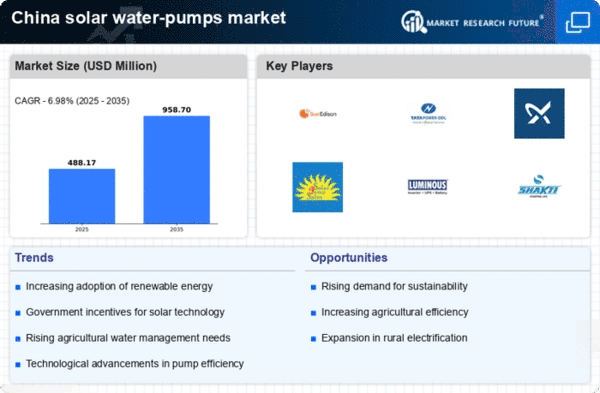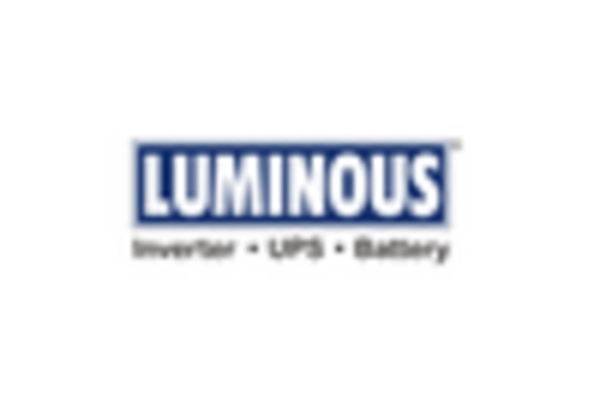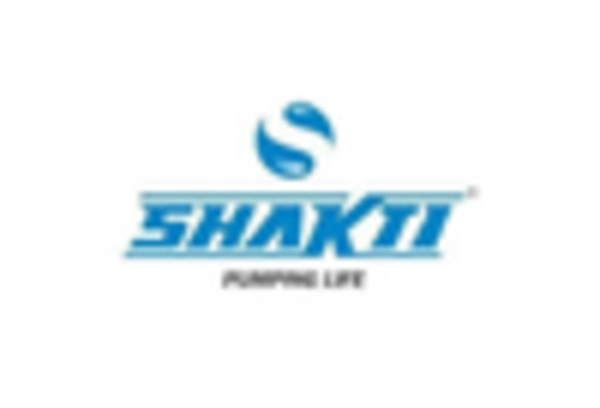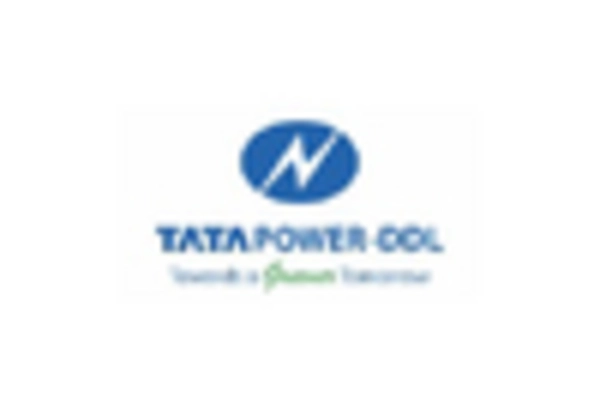Rising Energy Costs
The solar water-pumps market is significantly influenced by the rising costs of conventional energy sources in China. As energy prices continue to escalate, farmers and businesses are increasingly seeking alternative energy solutions to power their water-pumping systems. Solar water-pumps present a cost-effective and sustainable alternative, allowing users to harness solar energy for irrigation and other water-related needs. The initial investment in solar technology is often offset by the long-term savings on energy bills, which can be substantial. Furthermore, the decreasing costs of solar panel technology, which have dropped by over 80% in the last decade, make solar water-pumps more accessible to a broader range of users. This trend suggests that as energy costs rise, the solar water-pumps market will likely see increased adoption, particularly in rural areas where energy access is limited.
Increasing Water Scarcity
The solar water-pumps market is experiencing growth due to the escalating water scarcity in various regions of China. As agricultural demands rise, the need for efficient irrigation solutions becomes paramount. Reports indicate that approximately 70% of China's freshwater resources are utilized for agriculture, leading to a pressing need for sustainable water management. Solar water-pumps offer a viable solution, enabling farmers to access groundwater without relying on traditional energy sources. This shift not only conserves water but also reduces operational costs, making solar water-pumps an attractive option for farmers. The increasing awareness of water conservation practices further propels the demand for solar water-pumps, as stakeholders seek to mitigate the impacts of climate change and ensure food security. Consequently, The solar water-pumps market is likely to expand as more farmers adopt these technologies to tackle water scarcity.
Technological Innovations
Ongoing technological innovations are enhancing the efficiency and reliability of solar-powered systems in the solar water-pumps market. Advances in solar panel efficiency, battery storage, and smart irrigation technologies are transforming the landscape of water management in agriculture. For instance, the integration of IoT (Internet of Things) technology allows for real-time monitoring and control of water usage, optimizing irrigation practices. These innovations not only improve the performance of solar water-pumps but also reduce maintenance costs and increase user satisfaction. As technology continues to evolve, the solar water-pumps market is likely to attract more users who seek efficient and modern solutions for their water needs. The potential for further advancements suggests a promising future for the market, as stakeholders remain keen on adopting cutting-edge technologies.
Government Policies and Regulations
The solar water-pumps market is positively impacted by supportive government policies and regulations in China. The government has implemented various initiatives aimed at promoting renewable energy sources, including solar technology. For instance, subsidies and financial incentives for solar installations have been introduced, making it more feasible for farmers to invest in solar water-pumps. Additionally, the government's commitment to reducing carbon emissions aligns with the adoption of solar technologies, further encouraging the transition from fossil fuels to renewable energy. Reports indicate that the Chinese government aims to increase the share of renewable energy in its total energy consumption to 20% by 2025. This regulatory environment fosters growth in the solar water-pumps market, as stakeholders recognize the long-term benefits of aligning with national sustainability goals.
Environmental Awareness and Sustainability
The solar water-pumps market is increasingly driven by heightened environmental awareness. There is a growing emphasis on sustainability among consumers and businesses in China. As climate change concerns escalate, stakeholders are actively seeking eco-friendly solutions to reduce their carbon footprint. Solar water-pumps, which utilize renewable energy, align with these sustainability goals by providing a clean and efficient means of water management. The market is witnessing a shift in consumer preferences, with more individuals and organizations prioritizing environmentally responsible practices. This trend is further supported by educational campaigns and initiatives aimed at promoting sustainable agriculture. As awareness of the environmental impacts of traditional water-pumping methods grows, the solar water-pumps market is likely to expand, attracting a diverse range of users committed to sustainable practices.
















